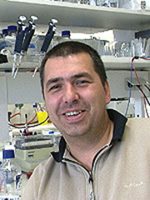Nils BroseProfessor, Director at the MPI for Experimental Medicine |
|
|
|
||
Major Research Interests: |
Nils Brose |
|
|
Research in the Department of Molecular Neurobiology focuses on the molecular mechanisms of synapse formation and function in the vertebrate central nervous system. Typically, synapses are formed between cellular processes of a sending and a receiving nerve cell. They are the central information processing units in the vertebrate brain where some 1012 nerve cells are connected by 1015 synapses to form an elaborate and highly structured neuronal network that is the basis for all forms of behaviour. Signal transmission at synapses is mediated by the regulated release of signal molecules (neurotransmitters) which then diffuse to the receiving nerve cell and change its physiological state. In the Department of Molecular Neurobiology, we combine biochemical, morphological, mouse genetic, behavioural, and physiological methods to elucidate the molecular basis of synapse formation and transmitter release processes. Our synaptogenesis research concentrates on synaptic cell adhesion proteins and their role in synapse formation. Studies on the molecular mechanisms of neurotransmitter release focus on components of the presynaptic active zone and their regulatory function in synaptic vesicle fusion. |
Address: |
|
Selected Recent Publications: |
||
|
Rhee J-S, Betz A, Pyott S, Reim K, Varoqueaux F, Augustin I, Hesse D, Südhof TC, Takahashi M, Rosenmund C, Brose N (2002) Beta Phorbol ester- and diacylglycerol-induced augmentation of transmitter release is mediated by Munc13s and not by PKCs. Cell 108: 121-133 |
